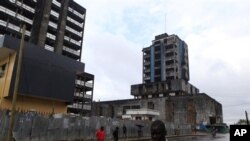The former leader of one of the rebel groups in Liberia’s 14-year civil war has said his movement received support from the government of neighboring Guinea.
Sekou Damate Conneh’s Liberians United for Reconciliation and Democracy (LURD) was accused of committing massacres as it fought with Charles Taylor’s former National Patriotic Front of Liberia (NPFL) rebels for control the capital, Monrovia.
Conneh said Guinea supported him because Conakry and the sub-regional group Mano River Union believed cross-border attacks by Taylor’s NPFL rebels made the region unstable.
Conneh’s comments came as Liberia observed a decade of peace since the 2003 signing of the Comprehensive Peace Accord that ended the country’s civil war.
“Since after the war, it’s about a decade, and we are talking about lasting peace and we just want to tell the world that we want no more into war, and we are happy that we are having peace in our country for a decade and there is no gun firing, and we promise that there is more gun going to be fired in Liberia,” he said.
Conneh said the Guinean government supported him because Conakry and the sub-regional group Mano River Union believed cross-border attacks by Taylor’s NPFL rebels made the region unstable.
“The Mano River countries were not safe with Charles Taylor. Freetown was not safe, Guinea was not safe. He carried out cross-border attacks, and this is why we were supported. We even drove the Charles Taylor rebels from Guinea, and that is where we got our support from,” Conneh said.
He said his LURD rebel group should be seen as liberators and not people who should be taken to the International Criminal Court for crimes against humanity, as some Liberians have been advocating.
“I personally did not commit any atrocities. I came to liberate the Liberian people, and the whole world saw that. It was not for power, it was not for jobs, and our people are free at last. There were no atrocities committed that warrant my people to go to court,” Conneh said.
In its 2009 report, Liberia’s Truth and Reconciliation Commission (TRC), formed to look into the causes of the civil conflict, recommended that President Ellen Johnson Sirleaf and 51 others be blocked from holding public office for 30 years for helping to form and finance warring factions.
The commission also recommended that nearly 100 individuals considered to be notorious perpetrators of gross human rights violations and war crimes be prosecuted in a court of competent jurisdiction.
Conneh, who also testified before the commission, said the TRC recommendations will not hold because Liberians consider him and members of his LURD rebel group as liberators.
“No way that I should go to court because I am a liberator. I came to free my people, and my people are rejoicing at that,” Conneh said.
Conneh said he has started a private business, of which is the CEO, and he’s living happily in Liberia.
Sekou Damate Conneh’s Liberians United for Reconciliation and Democracy (LURD) was accused of committing massacres as it fought with Charles Taylor’s former National Patriotic Front of Liberia (NPFL) rebels for control the capital, Monrovia.
Conneh said Guinea supported him because Conakry and the sub-regional group Mano River Union believed cross-border attacks by Taylor’s NPFL rebels made the region unstable.
Conneh’s comments came as Liberia observed a decade of peace since the 2003 signing of the Comprehensive Peace Accord that ended the country’s civil war.
“Since after the war, it’s about a decade, and we are talking about lasting peace and we just want to tell the world that we want no more into war, and we are happy that we are having peace in our country for a decade and there is no gun firing, and we promise that there is more gun going to be fired in Liberia,” he said.
Conneh said the Guinean government supported him because Conakry and the sub-regional group Mano River Union believed cross-border attacks by Taylor’s NPFL rebels made the region unstable.
“The Mano River countries were not safe with Charles Taylor. Freetown was not safe, Guinea was not safe. He carried out cross-border attacks, and this is why we were supported. We even drove the Charles Taylor rebels from Guinea, and that is where we got our support from,” Conneh said.
He said his LURD rebel group should be seen as liberators and not people who should be taken to the International Criminal Court for crimes against humanity, as some Liberians have been advocating.
“I personally did not commit any atrocities. I came to liberate the Liberian people, and the whole world saw that. It was not for power, it was not for jobs, and our people are free at last. There were no atrocities committed that warrant my people to go to court,” Conneh said.
In its 2009 report, Liberia’s Truth and Reconciliation Commission (TRC), formed to look into the causes of the civil conflict, recommended that President Ellen Johnson Sirleaf and 51 others be blocked from holding public office for 30 years for helping to form and finance warring factions.
The commission also recommended that nearly 100 individuals considered to be notorious perpetrators of gross human rights violations and war crimes be prosecuted in a court of competent jurisdiction.
Conneh, who also testified before the commission, said the TRC recommendations will not hold because Liberians consider him and members of his LURD rebel group as liberators.
“No way that I should go to court because I am a liberator. I came to free my people, and my people are rejoicing at that,” Conneh said.
Conneh said he has started a private business, of which is the CEO, and he’s living happily in Liberia.






